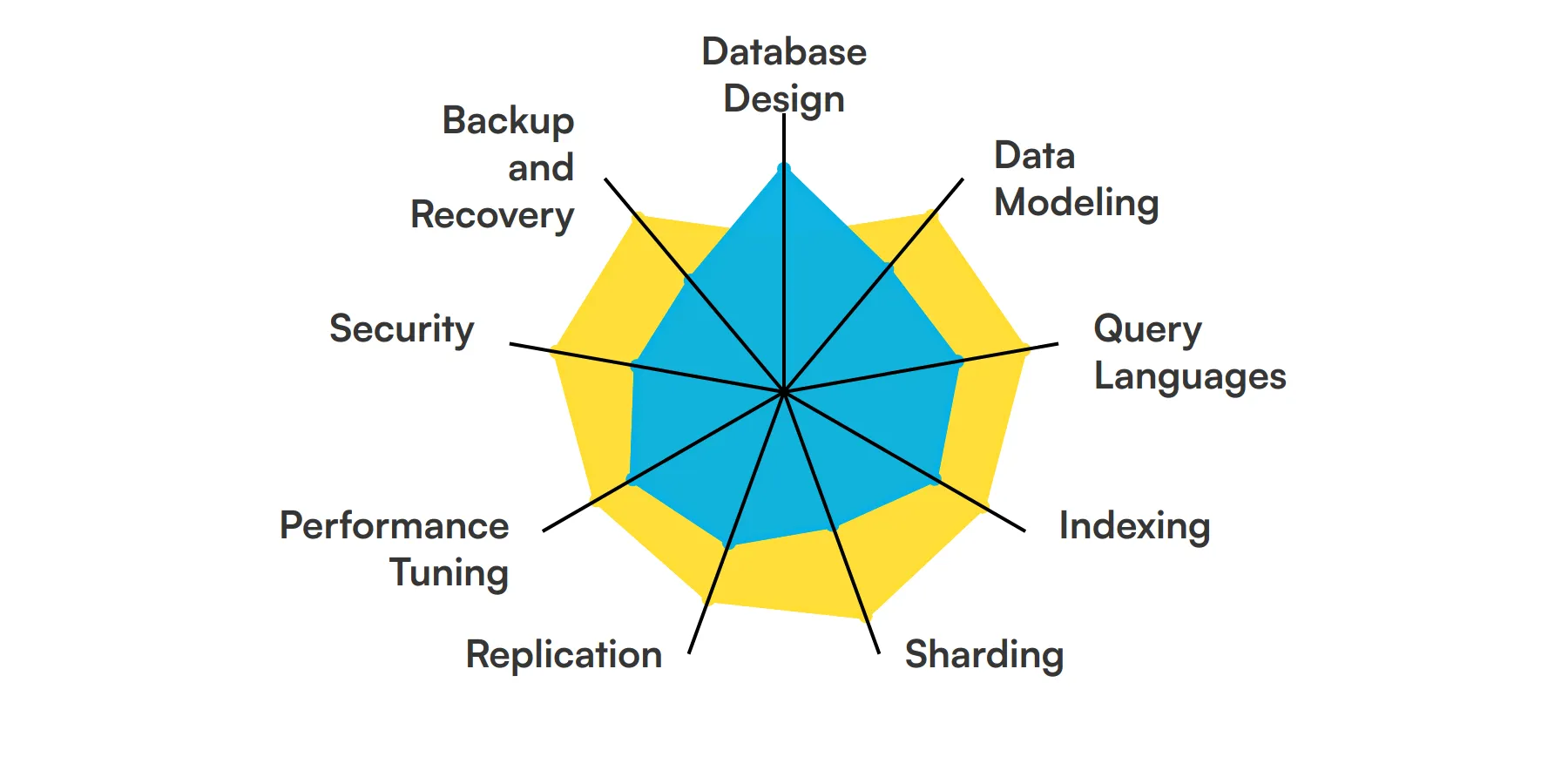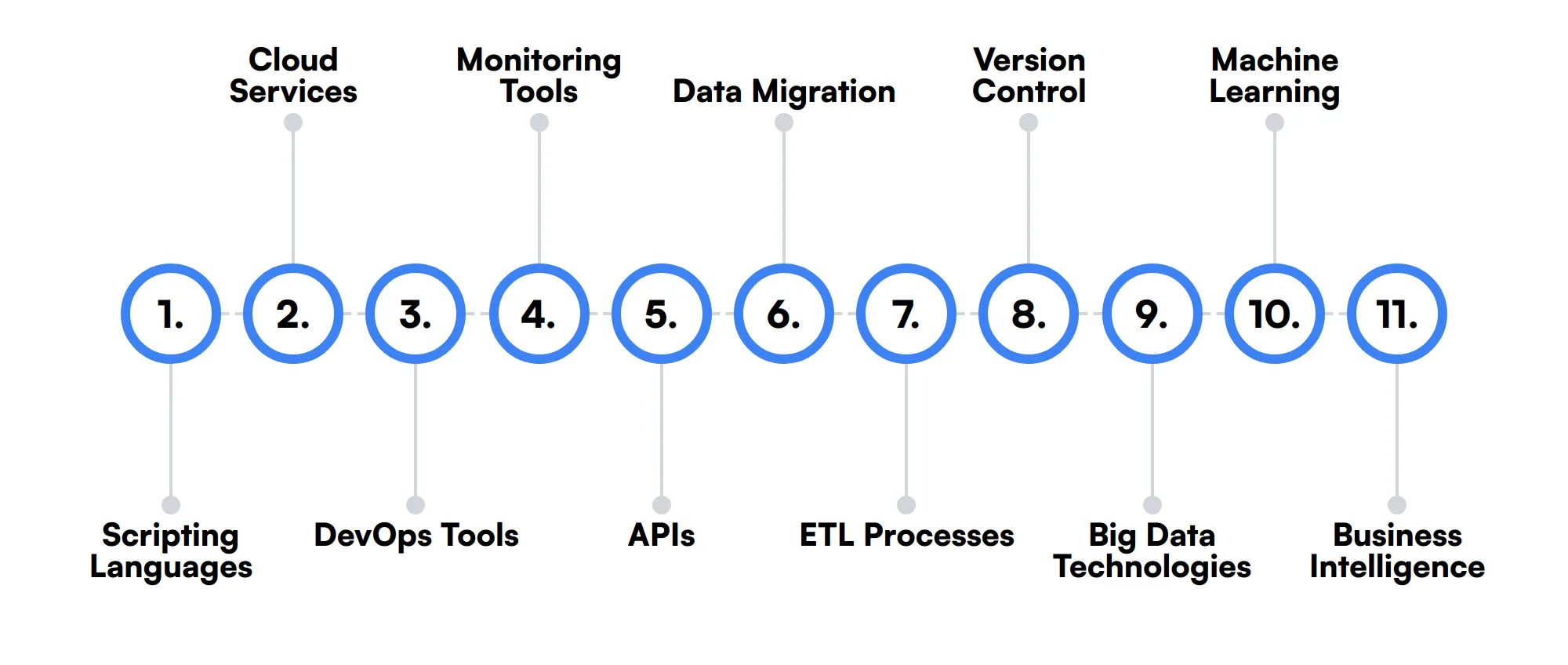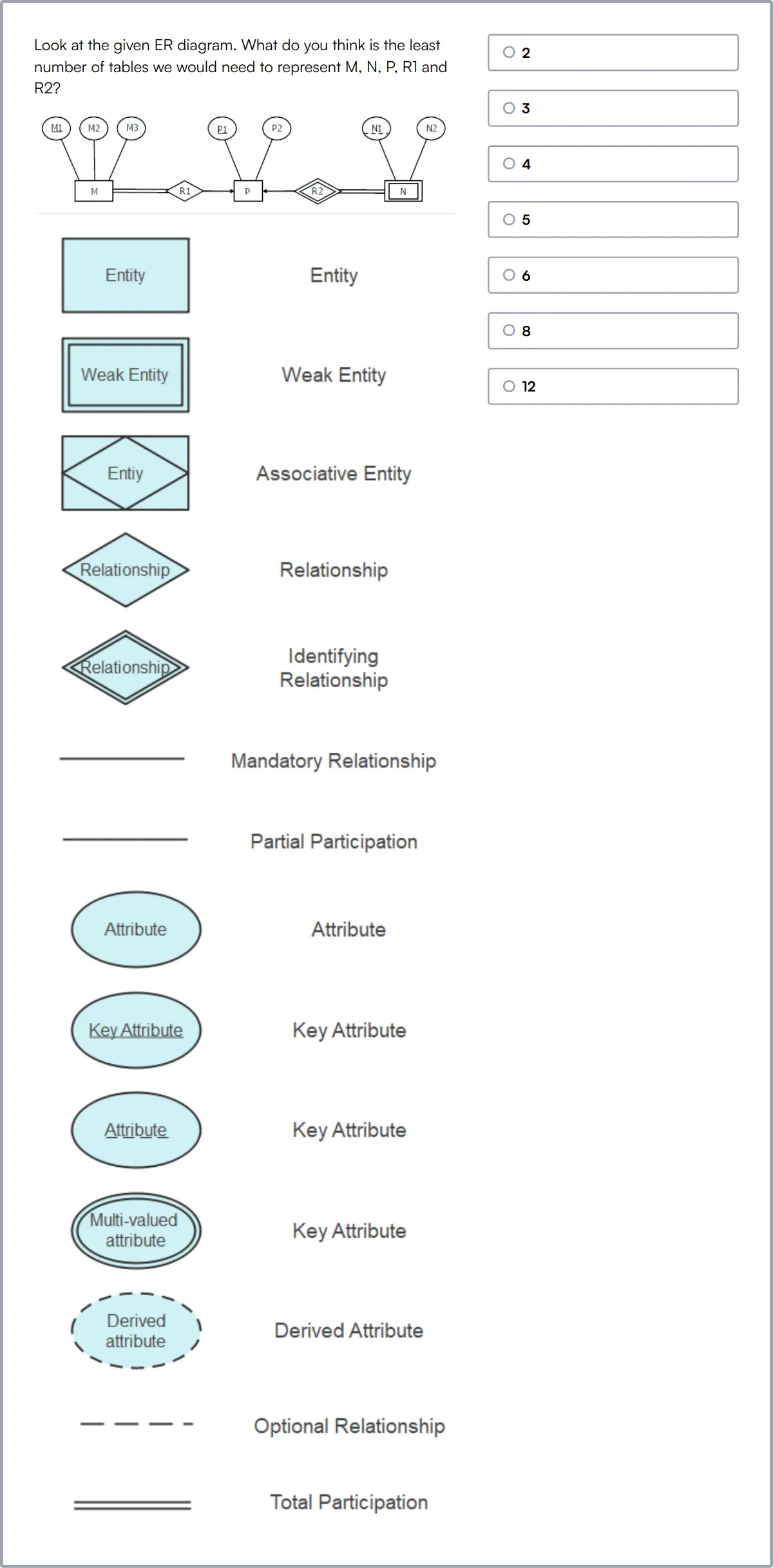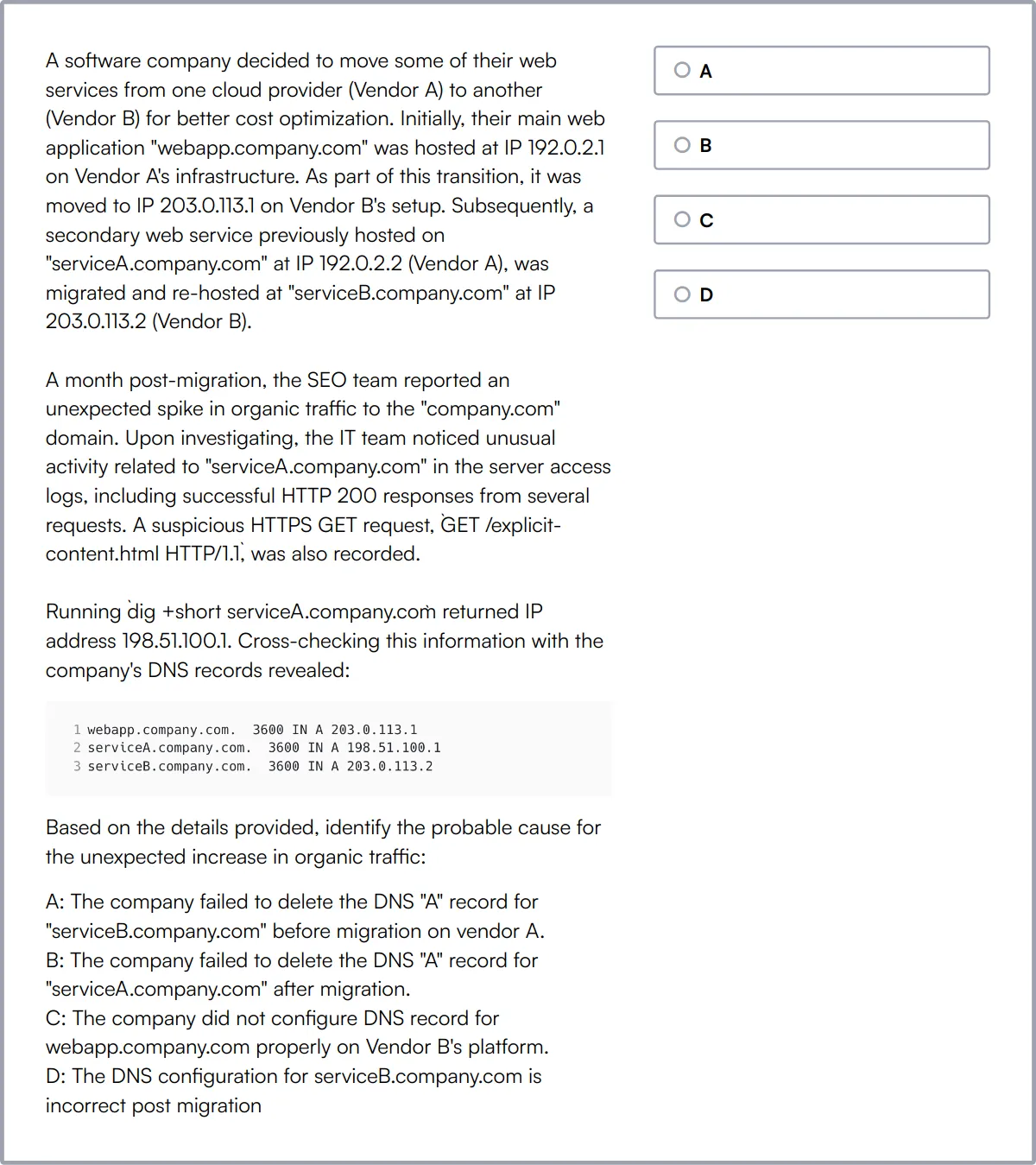NoSQL developers specialize in managing and manipulating non-relational databases, which are designed to handle large volumes of unstructured data. They play a key role in ensuring that data is stored, retrieved, and processed efficiently, making it accessible for various applications and analytics.
NoSQL development skills include proficiency in database technologies such as MongoDB, Cassandra, and Redis, as well as abilities in data modeling, query optimization, and performance tuning. Additionally, strong problem-solving skills and the ability to work collaboratively are important for success in this role.
Candidates can write these abilities in their resumes, but you can’t verify them without on-the-job NoSQL Developer skill tests.
In this post, we will explore 9 essential NoSQL Developer skills, 11 secondary skills and how to assess them so you can make informed hiring decisions.
Table of contents
9 fundamental NoSQL Developer skills and traits
The best skills for NoSQL Developers include Database Design, Data Modeling, Query Languages, Indexing, Sharding, Replication, Performance Tuning, Security and Backup and Recovery.
Let’s dive into the details by examining the 9 essential skills of a NoSQL Developer.

Database Design
A NoSQL developer must be adept at designing databases that can handle unstructured data. This involves understanding the specific requirements of the application and choosing the right type of NoSQL database, whether it's document-based, key-value, column-family, or graph-based.
For more insights, check out our guide to writing a Database Developer Job Description.
Data Modeling
Data modeling in NoSQL is different from traditional relational databases. A NoSQL developer needs to know how to model data to ensure high performance and scalability. This includes understanding how to denormalize data and design schemas that align with the application's access patterns.
Query Languages
While NoSQL databases often use different query languages than SQL, understanding these languages is crucial. For example, a NoSQL developer should be familiar with MongoDB's query language or Cassandra Query Language (CQL) to efficiently retrieve and manipulate data.
Check out our guide for a comprehensive list of interview questions.
Indexing
Proper indexing is key to optimizing query performance in NoSQL databases. A NoSQL developer must know how to create and manage indexes to ensure that queries run quickly and efficiently, without compromising on the database's performance.
Sharding
Sharding is a method of distributing data across multiple servers. A NoSQL developer needs to understand how to implement sharding to ensure that the database can scale horizontally, handling large volumes of data and high traffic loads.
Replication
Replication involves copying data across multiple servers to ensure high availability and fault tolerance. A NoSQL developer should be skilled in setting up and managing replication to prevent data loss and ensure that the database remains available even in case of server failures.
Performance Tuning
Performance tuning is essential for maintaining the efficiency of NoSQL databases. A NoSQL developer must be able to identify performance bottlenecks and optimize the database configuration, queries, and schema to improve overall performance.
Security
Security is a critical aspect of database management. A NoSQL developer should be knowledgeable about implementing security measures such as authentication, authorization, encryption, and auditing to protect sensitive data from unauthorized access and breaches.
For more insights, check out our guide to writing a Cyber Security Analyst Job Description.
Backup and Recovery
Backup and recovery strategies are essential to ensure data integrity and availability. A NoSQL developer must know how to implement effective backup solutions and recovery procedures to minimize data loss and downtime in case of failures.
11 secondary NoSQL Developer skills and traits
The best skills for NoSQL Developers include Scripting Languages, Cloud Services, DevOps Tools, Monitoring Tools, APIs, Data Migration, ETL Processes, Version Control, Big Data Technologies, Machine Learning and Business Intelligence.
Let’s dive into the details by examining the 11 secondary skills of a NoSQL Developer.

Scripting Languages
Familiarity with scripting languages like Python, JavaScript, or Ruby can be beneficial for automating database tasks and integrating NoSQL databases with other applications.
Cloud Services
Understanding cloud services like AWS, Azure, or Google Cloud can help a NoSQL developer deploy and manage databases in a cloud environment, leveraging the scalability and flexibility of cloud infrastructure.
DevOps Tools
Knowledge of DevOps tools such as Docker, Kubernetes, and Jenkins can assist a NoSQL developer in automating deployment, scaling, and management of NoSQL databases.
Monitoring Tools
Using monitoring tools like Prometheus, Grafana, or ELK Stack can help a NoSQL developer keep track of database performance, identify issues, and ensure the system runs smoothly.
APIs
Understanding how to work with APIs is important for integrating NoSQL databases with other systems and applications. A NoSQL developer should be comfortable with RESTful and GraphQL APIs.
Data Migration
Data migration skills are useful for transferring data from traditional relational databases to NoSQL databases or between different NoSQL databases. This involves planning and executing data migration strategies with minimal downtime.
ETL Processes
Experience with ETL (Extract, Transform, Load) processes can help a NoSQL developer in data integration tasks, ensuring that data is accurately and efficiently moved between systems.
Version Control
Proficiency with version control systems like Git is important for managing changes to database schemas and configurations, enabling collaboration and maintaining a history of changes.
Big Data Technologies
Familiarity with big data technologies like Hadoop, Spark, or Kafka can be advantageous for a NoSQL developer working with large-scale data processing and real-time data streams.
Machine Learning
Basic knowledge of machine learning can be useful for a NoSQL developer, especially when working on projects that involve data analysis, predictive modeling, or recommendation systems.
Business Intelligence
Understanding business intelligence tools and techniques can help a NoSQL developer in creating data-driven insights and reports, aiding decision-making processes within the organization.
How to assess NoSQL Developer skills and traits
Assessing the skills and traits of a NoSQL Developer can be a challenging task. NoSQL Developers need a diverse set of skills, including database design, data modeling, query languages, indexing, sharding, replication, performance tuning, security, and backup and recovery. These skills ensure that they can handle the unique demands of NoSQL databases, which differ significantly from traditional relational databases.
Resumes and certifications can provide some insight into a candidate's background, but they don't always reflect their practical abilities or how well they will fit into your team. Skills-based hiring practices, such as talent assessments, offer a more reliable way to evaluate a candidate's competencies. Adaface on-the-job skill tests can help you achieve a 2x improved quality of hires by focusing on real-world scenarios and practical skills.
Let’s look at how to assess NoSQL Developer skills with these 3 talent assessments.
Data Modeling Skills Test
Our Data Modeling Skills Test evaluates a candidate's proficiency in database design and SQL, focusing on their ability to create effective ER diagrams, normalize data, and develop relational schemas.
The test assesses candidates on their skills in data integrity, data mapping, data validation, and data transformation, ensuring they can handle complex data architecture scenarios.
Candidates who score well demonstrate a thorough understanding of data modeling principles and the ability to apply these to real-world database management tasks.

NoSQL Online Test
Our NoSQL Online Test challenges candidates on their knowledge of various NoSQL databases such as Column-Store, Document-Store, and Key-value store systems, focusing on data modeling, indexing, and querying.
This test evaluates a candidate's understanding of database design and data consistency in NoSQL environments, crucial for developing scalable and efficient applications.
High-scoring individuals are adept at leveraging NoSQL technologies to optimize data retrieval and storage, enhancing application performance.
Cyber Security Assessment Test
Our Cyber Security Assessment Test assesses candidates on a broad range of cybersecurity topics, from network protocols and firewalls to advanced cryptography and web security.
The test challenges candidates to identify and mitigate potential security threats such as SQL injections, DDoS attacks, and various forms of malware, ensuring they can secure systems against modern cyber threats.
Successful candidates will demonstrate a comprehensive understanding of cybersecurity defenses, risk assessments, and the ability to implement effective security measures.

Summary: The 9 key NoSQL Developer skills and how to test for them
| NoSQL Developer skill | How to assess them |
|---|---|
| 1. Database Design | Evaluate the ability to structure databases for optimal performance and scalability. |
| 2. Data Modeling | Assess skills in creating data models that accurately represent business requirements. |
| 3. Query Languages | Test proficiency in writing and optimizing queries for data retrieval. |
| 4. Indexing | Check the capability to implement and manage indexes for faster query performance. |
| 5. Sharding | Determine knowledge in distributing data across multiple servers for load balancing. |
| 6. Replication | Evaluate understanding of data replication techniques for high availability. |
| 7. Performance Tuning | Assess skills in optimizing database performance and resolving bottlenecks. |
| 8. Security | Check the ability to implement security measures to protect data integrity. |
| 9. Backup and Recovery | Evaluate knowledge in setting up and managing backup and recovery processes. |
Microsoft Azure Online Test
NoSQL Developer skills FAQs
What are the key skills required for a NoSQL Developer?
A NoSQL Developer should be proficient in database design, data modeling, and query languages specific to NoSQL databases. Skills in indexing, sharding, and replication are also important, along with performance tuning, security, and backup and recovery strategies.
How can recruiters assess a candidate's expertise in NoSQL database design?
Recruiters can evaluate a candidate's expertise in NoSQL database design by reviewing past projects that involved complex data structures and scalability solutions. Additionally, posing scenario-based questions during interviews can help assess their practical knowledge and problem-solving skills.
What is the importance of scripting languages in NoSQL development?
Scripting languages, such as Python or JavaScript, are important for NoSQL developers as they help in automating database tasks, writing map-reduce functions, and managing data transformations and migrations efficiently.
Why is knowledge of cloud services beneficial for NoSQL developers?
Knowledge of cloud services is beneficial because many NoSQL databases are hosted on cloud platforms. Understanding cloud services helps developers manage databases at scale, handle data distribution, and optimize resource usage.
What tools should NoSQL developers be familiar with for effective monitoring and performance tuning?
NoSQL developers should be familiar with monitoring tools like Prometheus or Nagios and performance tuning tools that help in database optimization. Knowledge of these tools aids in ensuring database health and optimal performance.
How do APIs integrate with NoSQL databases in application development?
APIs play a critical role in integrating NoSQL databases with application logic, allowing for seamless data interaction and manipulation. Developers must be adept at creating and managing APIs to ensure efficient data flow between the database and the application.
Can you explain the role of data migration and ETL processes in NoSQL environments?
Data migration and ETL (Extract, Transform, Load) processes are essential for transferring data between different databases or systems and for preparing data for analysis. NoSQL developers must manage these processes to ensure data integrity and compatibility.
What is the significance of version control in NoSQL development projects?
Version control systems like Git are important in NoSQL development projects to manage changes to the database scripts and collaboration among team members. It helps in tracking modifications, reverting changes, and maintaining the stability of development environments.
Assess and hire the best NoSQL Developers with Adaface
Assessing and finding the best NoSQL Developer is quick and easy when you use talent assessments. You can check out our product tour, sign up for our free plan to see talent assessments in action or view the demo here:

40 min skill tests.
No trick questions.
Accurate shortlisting.
We make it easy for you to find the best candidates in your pipeline with a 40 min skills test.
Try for freeRelated posts
Free resources



